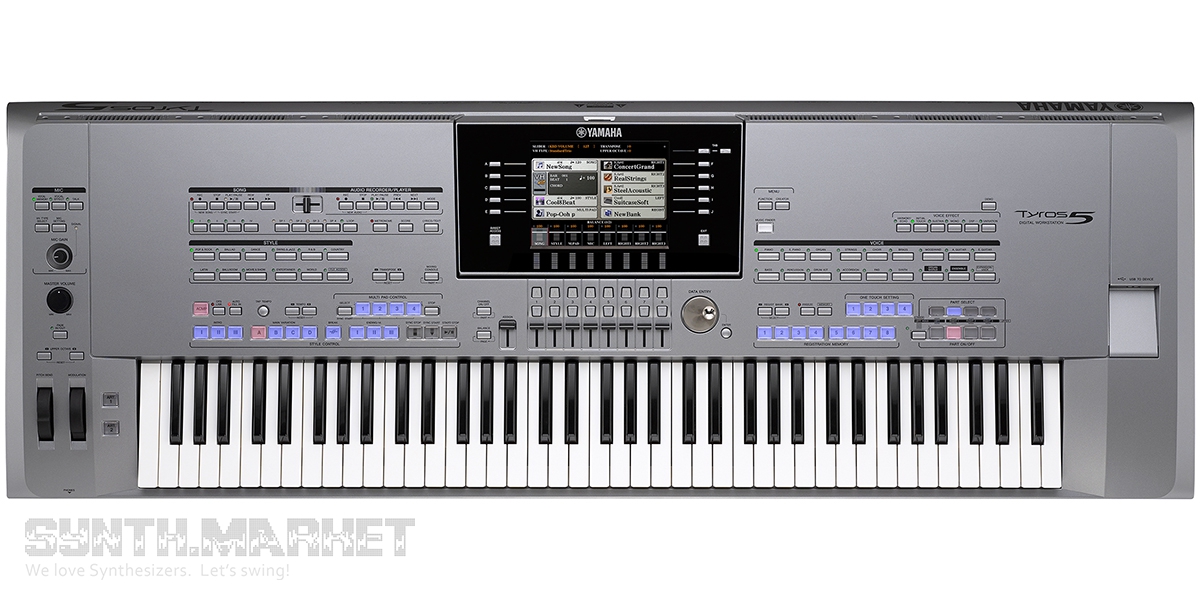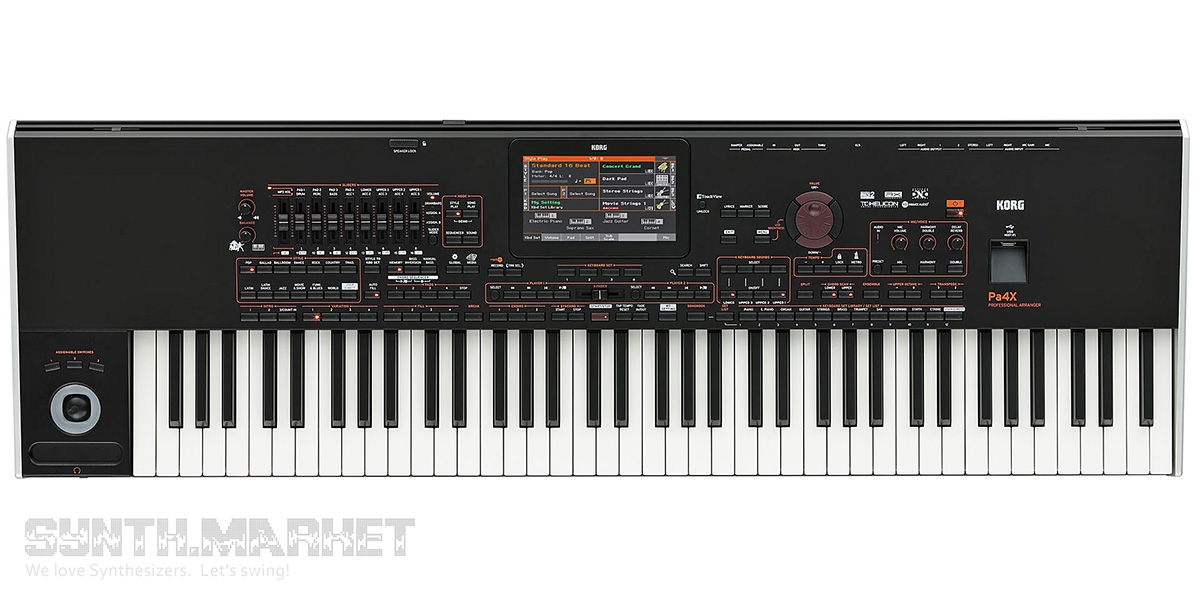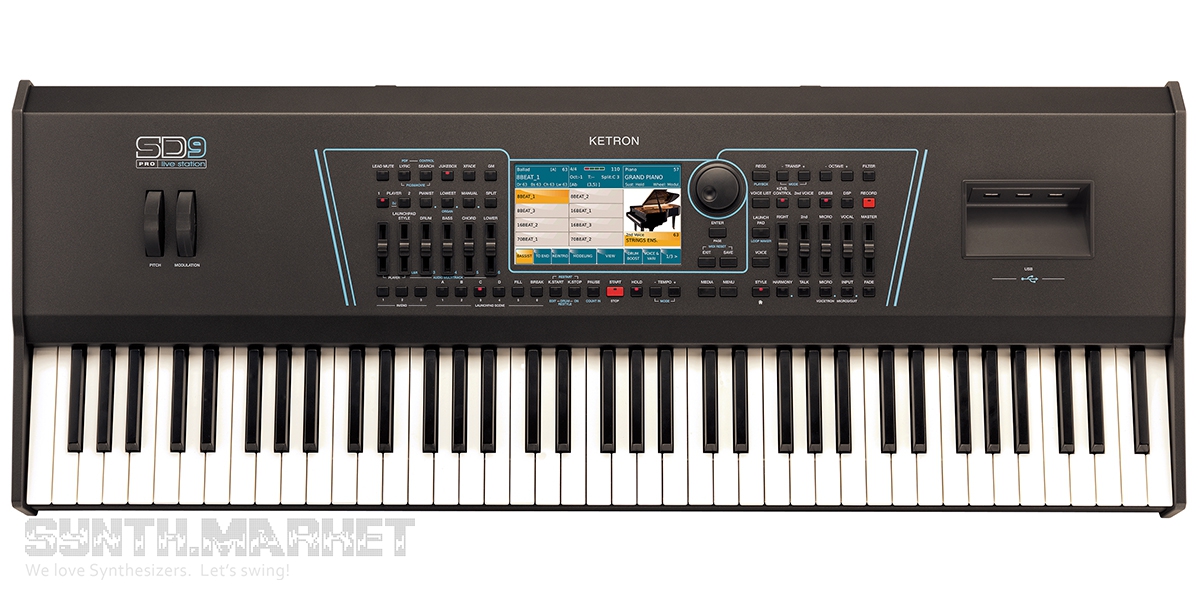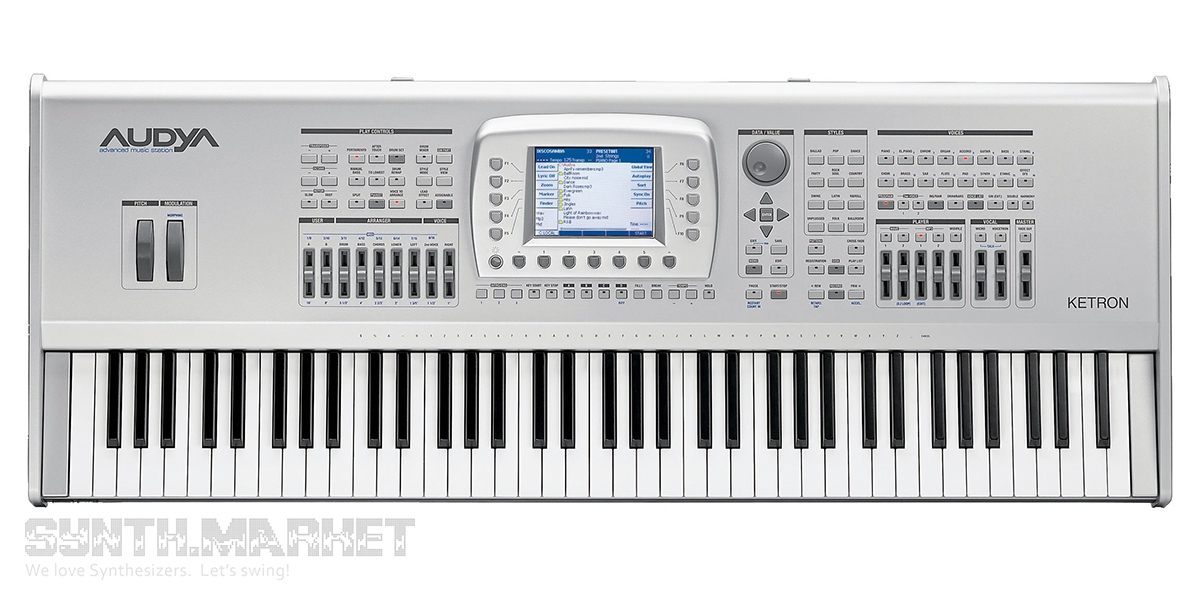The composer’s workstation Tyros 5 offers 1200 sounds which Yamaha traditionally calls “voices” and each one is formed of 8 elements by layering, splitting, switching and etc. As for the piano sounds, there is the new stereo Concert Grand based on CFIIIS with a damper resonance effect. The piano section offers a number of DX, Wurlitzer, Clavichord, CP-80 variations and one Rhodes voice. Tyros 5 got the elaborated effects including Real Reverb, Real Distortion as well as sound generating via VCM (Virtual Circuit Modeling). Vintage Keyboards expansion pack would require Flash ROM purchasing.
Organ samples feature distinctive tone generator timbres, although rotary speaker simulation grabbed an unwanted dose of noise. Theatre Pipe and Classical Pipe sounds, combinations and the new interface to manage the Organ World are the undeniable strengths of the workstation. Yamaha puts instruments into groups with quite funny names: Sweet! for wind voices featuring vibrato, Cool! – electronic instruments put through their own amplifiers and speakers, Live! – stereo sounds keeping the acoustic qualities and peculiarities regarding the conditions they were recorded in, Super Articulation1, reacting to dynamics (for example, staccato or legato performing), Super Articulation2, controlling the attack and release phases, conducing to nice slides.
Tyros5 allotted enough space to high quality strings, pads, drums, lead and synth voices. You can adjust the sound without resorting to Expansion Manager but just with tweaking its depth and offset, modulation wheel, resonance, attack, decay, release, vibrato settings and delay. The ensemble function helps to emphasize properly the voices in the chord.
Yamaha release this top arranger in two keyboard versions – a 76- and 61-note instruments, both of them are synth types featuring aftertouch and being velocity sensitive. The price for a 5-octave version is $5200, a 6-octave - $5500 which puts Yamaha on the very top above other workstation makers marking it as the priciest one on the market. But it also makes us think whether we should overpay (actually to pay the double price) in order to get a “music computer” if can buy a mid-range arranger + have a PC with an installed DAW and it would cost us the same amount of money while also give us more possibilities offering flexible editing and constant updating.
Korg Pa4X comprises 1800 sounds and an engine expandable up to 24 oscillators. It produces multi-layer stereo Concert Grand sounds which can be processed with an adjusted resonance, noise or pedal effects. One of the three acoustic piano variants includes M1 sounds. All in all Pa4X palette features Rhodes, Wurly and Clav sounds, СР-80, DX imitations and is a little bit more diversified than Tyros is. But as well as Tyros Korg Pa4X features Leslie in its samples but seems to make it providing higher quality. Although if you overdo with the chorus/vibrato effects you might hear a disagreeably cheerful whistle. Pa4X reacts to your performing technics owing to the articulate and precise DNC technology (Dynamic Nuance Control). The engineers were also successful in designing string and drum sections for the workstation.
Tyros 5 offers auto accompaniment function with 500 styles and practical Synchro Start and Stop options. Pa4X gives you more possibilities for re-setting of the chosen auto accompaniment offering the great selection of drums and individual control for each instrument of the ensemble including the independent mute function.
Pa4X comprises 10 blocks of the effects: one insert effect and 2 master effects per 3 Keyboard Tracks as well as 4 insert and 3 master effects for the accompaniment. Tyros 5 offers global master reverb and chorus as well as 9 DSP blocks and master compressor at the output stage. Korg has acquired the rights for Waves MAXX effects. The guitar mode of Pa4X allows achieving the effects inherent to those performing moments while playing the real guitar with the help of Applied Acoustics Systems Strum technology; Tyros 5 offers a catchall processing owing to its groove function.
Pa4X helps to create libraries featuring SongBook which saves the styles, sounds and settings. Korg offered much more possible manipulations with settings and assignments that’s why we think its SongBook seems to be a better treat than Registration system and Music Finder featured in Yamaha.
Korg releases its top arranger in two versions – 76-note and 61-note keyboards and as well as those by Yamaha they are dynamic and feature aftertouch.
The price of a 5-octave version is about $3800, 6-octave - $4000. Considering the difference in price and parameter range many would prefer Pa4X to Tyros 5. Korg beats Yamaha regarding quality/price proportion.
Ketron SD9 can surely try to compete with Korg – it gives way in overall numbers but the quality is great. SD9 is the keyboard with 76 semi-weighted keys (4 sensitivity modes, supports aftertouch and portamento), offers an incredible 48-part multitimbrality, 128 polyphony, 670sounds, 48 drum sets and 300 styles. The multi-layer sampling and long natural decay contributes to the high quality of the voices. Ketron paid attention to prepare a good selection of live audio drum sessions for your arranging and now offers 250 new audio drums and 400 variants of Latin percussion. The library feature the great variety of guitar sounds. The memory is re-writable and gives you up to 700Mb. Thanks to the new editing menu you can easily create your own multi-samples and drum sets saving them and storing in the instrument. Player supports Mp3, MIDI, Wav, Flv, Cdg, Mp4, Avi, M4a, Jpg and Txt and offers smart cross fade, lead mute functions as well as the search by an alphabet or number; DJ menu includes Tap Tempo, Pitch, Cut Off, Resonance, Tempo, Brake and Back Spin possibilities.
The modeling functions are the real strength of this arranger – you can choose and control hundreds of instruments featured in the SD9 sections of any style. SD9 allows storing a great number of settings: 4 banks for memory (1024 registrations each), offers the possibilities to make MIDI and audio recordings. The digital processing includes the key stages: Chorus, Reverb, Phaser, Tremolo, Flanger, Echo Delay, Overdrive, 4 parametric equalizers, 2 independent insert effect sections as well as a high quality distortion and auto-panning; the chain can number up to 10 user effects. SD9 has several playback modes. There are a XLR microphone input with an adjustable volume, a separate audio output and such effects as Reverb, Echo, Equalizer, Noise Gate, Compressor, Pitch Shift with 10 preset combinations and 10 programmable ones + vocalizer.
Audya made by Ketron is a rare unit featured in a studio though it’s not so bad, it’s actually a very good arranger – the price is fine with us and the functionality is more than satisfactory. The engineers consider their creature as the most powerful composer’s arranger in the world. It just screams “pay attention” and well, you should.Audya is an entertainment multimedia keyboard, so it offers a whole lot of possibilities and features: video interface (PAL, NTSC, Super VHS support with position control), professional multi player - 2 x Wav, 2 x Mp3, 2 x Midi File player, - hi-quality real time stretching and audio transposition, Play List, Autoplay, Dj Loops, A-Drums, SFX, Cross Fade, MP3 Encoder (editable resolution).
Basic Audya functions are: 197-note polyphony, 300 styles (4 variations each), 320 banks for memory, 384 orchestra presets, a hundred of drum sets, 4-band equalizer, vocoder and voice harmonizer. The overall number of the factory presets is 430 which is much fewer than that number the top Japanese stations offer, but it’s really enough for the accompaniment of various genres. By the way, this Italian arranger is very popular in the Arab states as well as in Central, Southern and Eastern Europe, even in Latin America. Among other peculiarities there are: digital organ (9 drawbars are emulated with sliders), built-in audio player for WAV and MP3, SMF player for MIDI files, accordion-mode, 5-voice vocalizer, 2-track audio recorder.
Audya supports the assignable brand pedal Foot Switch (FS13 and FS6).
The connectivity features MIDI out/thru, two MIDI ins, Audya also has 32 MIDI channels and GM2 support. The workstation offers 4 assignable outputs, 2 linear inputs, two for XLR microphones, linear L/R output, 2 USB per computer and one for a flash drive. One of the most amusing functions is the video interface which allows the instrument to serve as a multimedia station – actually we’ve seen such a feature only in Roland BK-7m sound module though it gives a poorer functionality. Another fact which puts Ketron together with the Japanese corporations is that Audya sports a 32-part multitimbrality which is a rare thing (you could meet this thing in Roland XV-5080).
As for the number of versions Ketron offers, we could say it beats all the Japanese colleagues. The Italian manufacturer gives us two standard keyboard versions: Audya 5 with 61 semi-weighted velocity sensitive keys and aftertouch and Audya with a 6-octave keyboard – also featuring aftertouch. And which is more…! Unlike Yamaha and Korg, Ketron offers a unique arranger module Audya 4! And even that’s not all. The Italian designers are ready to present you an exclusive arranger with a chromatic keyboard called Audya 8. It costs $4500 which is a lot, but anyway it’s a unique musical instrument. You might say that Tyros 5 features a chromatic one as well, but wait a little – Yamaha offers it as a third-party “bonus” while Ketron features it as a common factory version.
We believe that the most attractive price/quality proportion is offered by Korg Pa4X – Korg is an influential brand name and it’s really as big as it sounds. If you think we might have missed something, please let us know in the comments about your ideas on a perfect arranger. Whether it’s a top workstation or a mid-range arranger + all the VSTi or any other possible configuration…




